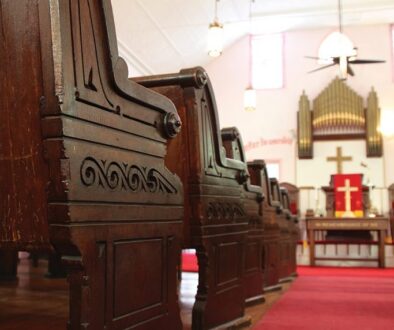Selected Shorts

It’s a bitterly cold, windy mid-February day in New York City, and in the streets around Times Square an inch or so of newly fallen snow partially covers the frozen, dirty black piles of ice that line the curbs. It’s only eight o’clock in the morning, but sixteen floors above West 46th Street, in the ultra-modern, high-tech building that houses the Actors Equity Association, already there are dozens of people queued up outside Studio A. Long banquettes line the corridors, under large, colorful photographs of historic Broadway theaters, and in a nearby room some are pacing up and down, whispering lines to themselves, sitting silently rehearsing the monologue they’re about to deliver, texting or reading emails on their phones, or just staring into space. No one’s saying a word.
It’s the first of two days of auditions for Cape May Stage’s 2015 season. Inside Studio A awaits a trio of people from the theater: Roy Steinberg, the artistic director; Marlena Lustik, who’s married to Steinberg and who’s a veteran actor, director and playwright; and Patrick Mathis, a staffer. They’re sitting at a pair of folding tables at one end of what could be a modern yoga studio or exercise room. Floor-to-ceiling mirrors cover one wall, and the floor is polished, blonde wood. The only prop, if that’s what you’d call it, is a single, metal folding chair. At the tables, Steinberg is poring over the first stack of resumes, complete with glossy head shots, from the actors who are about to file in, one by one. By the end of the next day, he’ll have seen hundreds, from veteran Broadway and film actors to young, inexperienced beginners.
Here’s what doesn’t happen at an audition. An actor doesn’t come in, tell you about herself, talk about her career goals, get into a conversation about the profession and her experience in it, ask the director what he’d like to hear and what he’s interested in – and then perform, get some feedback, and leave the room feeling like she’s made some new friends. Hardly—what actually happens: each audition is strictly limited to just two minutes. Each would-be player enters the room, with his or her resume in Steinberg’s hands, already delivered by an Actors Equity staffer. There’s no time for any small talk, except perhaps a brief greeting. With no fanfare, the actor launches into a prepared monologue – then stops, smiles or nods, and exits. That’s it—each actor has 120 seconds to get in, perform, and get out. It seems brutal, nerve-wracking.
“At the end of the day, I’ll have a zillion resumes,” says Steinberg.
Nevertheless, it seems to work. Last year, Charlotte Munson auditioned for the 2014 season at Cape May Stage. After the audition, she left, not knowing what Steinberg thought. “I had no idea, until I got an email from Roy offering me the job,” she says. Cast as Elvira, a playful, ghostly English ex-lover in Noel Coward’s Blithe Spirit, Munson cornered Steinberg at the after-party on opening night. “I asked why he picked me, and he said, ‘Because you were the best!’” Steinberg agrees. “Charlotte had a kind of spark, and she could do a British accent.” This year, Munson was back to try again, performing a dramatic monologue from What We’re Up Against, a play by the prolific writer Theresa Rebeck.
Steinberg, who says that he expects to cast about half the parts for the upcoming season from what the industry calls Equity Principal Auditions (EPAs), maintains his own system for keeping track of the actors. He loosely ranks the actors into categories roughly numbered 1, 2, and 3, and tries to match each potential actor with a specific character in one of the season’s shows. “It’s a mysterious thing, chemistry,” he says. “Some of it is a leap of faith. Some of it is physical. There’ll be some people who just ‘pop,’ who change the energy in the room.”
Under Actors Equity rules, every professional equity theater—whether it’s the Kennedy Center in Washington, D.C. on Broadway, or a small regional theater—must conduct an EPA for actors, though artistic directors aren’t required to cast solely through equity auditions. Sometimes, says Steinberg, he’ll cast an actor through the actor’s agent, or from a chance meeting, via contacts with friends, or on the recommendation of another actor who might be perfect for the part. Actors are well aware that the chance they’ll be cast from an open-call EPA is slim. And it’s stressful, to say the least.

Joseph Robinson, who was cast in a leading role in 2014 in Moon Over Buffalo at Cape May Stage, says that he deals with the stress in part by remembering that the people listening to your audition want you to succeed. And, like Munson, Robinson was cast by auditioning last year. “I got that straight through the EPA, and that was kind of shocking to me,” he says. “Usually, if you get it at all, there are call-backs and follow-ups.” Robinson, who auditioned again this year, performing a speech from Stephen Adley Guirgis’ Den of Thieves, says that he was impressed with Steinberg’s ability to make casting decisions like that. “It’s a real testament to Roy,” he says.
Attracting quality performers to appear in first-rate productions at Cape May Stage is one of Steinberg’s key tasks, especially since the pay is, well, less than stellar. Under the pay scale set by Actors Equity for a regional theater such as Cape May’s, actors get a little more than $400 per week, plus benefits, and it is, for many New York-based actors, a relatively small and out-of-the-way venue. “Often patrons who come to Cape May Stage will ask me, ‘How do you get people to come here?’” says Steinberg. But there are many reasons why an actor will want to come to Cape May, he says: they may really want to do a particular part, or to work with a particular actor who’s already signed on, or because they know and trust Steinberg as a director. “Our reputation is spreading. And the word gets out pretty quickly.Actors will say, ‘Don’t go here,’ or ‘Do go there.’ And I think the word on us is pretty good.”
Actors, especially those trying to build a career and fill out a resume, aren’t deterred by the pay. Tia Andriani, a talented actor and vocalist who studies at the American Musical and Dramatic Academy in New York, says, “I think that Cape May Stage would be a great launching place, and I love the fact that it’s a small community and that it’s supported by the community.” Munson, whose career is well underway, says, “It was probably the most beautiful place I’ve ever done summer stock.” (As for the pay, she says, “It’s better than getting zero dollars!”) And Robinson, an experienced actor with leading-man good looks, says, “It’s a beautiful town, with idyllic surroundings and the perfect place to escape from New York City. It has an awesome feel to it.”
On another snowy day, with temperatures in the low teens, Teresa Ann Volgenau is sitting in a little coffee house just off Broadway on West 51st Street. A few days earlier, she’d auditioned for Steinberg and Lustik, and she’s waiting to hear if she’ll be called back for a part in Mary, Mary or Dead Man’s Cell Phone, both part of the upcoming season. At her audition—perhaps unique to any of the other actors—she performed a monologue (“heartwarming and a little funny, too,” she says, and delivered in an Irish accent) that she wrote herself. At the end of her monologue, in a very brief exchange, Steinberg asked her about why, after an accomplished career in dance, she was auditioning for the stage, and she replied, “I’m hungry.”
Now, she teaches ballet and dance in New York, having performed in San Francisco, Los Angeles, and Europe and studied with the Joffrey Ballet School, she says that she’s determined to create a career for herself as a dramatic actor. “My love is the stage,” says Volgenau. “So I’m out here pounding the pavement, in and out of auditions. Despite everything I’ve done, I’m a little green. I haven’t done anything on Broadway or Off Broadway. And, yes. I’m hungry.”



